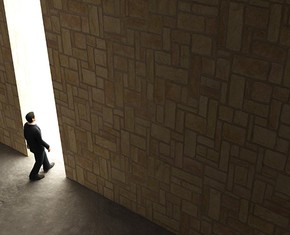The views expressed in our content reflect individual perspectives and do not represent the authoritative views of the Baha'i Faith.
God intervenes in human history not once, Baha’is believe, but continuously.
Where traditional Christian belief views the appearance of Christ as the unique and only necessary intervention of God in human history, the Baha’i teachings view God’s intervention in human history as a continuum—as one ongoing spiritual revelation. Indeed, the Baha’i belief in progressive revelation—the succession of prophets and the progression of revealed truth about reality—is at the heart of all Baha’i theology.
Thus, where Milton in his Paradise Lost avoids the usual Christian belief in the uniqueness of Christ, he does not avoid the myriad logical problems that result from perceiving Christ’s advent as the sole and sufficient occasion in human history for the revelation of God’s perfection and the redemption of humankind.
Milton does not explain, for example, why God, Who is compared by Christ to a loving heavenly Father, would give His children only one opportunity to be redeemed. Neither does Milton deal with the fact that all understanding of God (“right reason”) is a progressive process, not the sudden realization of one specific idea or set of ideas.
The Baha’i teachings recognize the divinity and exalted station of Christ. Indeed, it would be accurate to say that the Baha’i teachings accept all the utterances of Christ in the Biblical texts as authoritative and true. But Christ himself never stated that his advent was the sole, unique revelation from God, nor did he ever assert that he was the last appearance of such a spiritualizing force. Instead, he frequently chided the Jews for having perpetrated in the past what they were about to recommit by persecuting him:
Therefore I send you prophets and wise men and scribes, some of whom you will kill and crucify, and some you will scourge in your synagogues and persecute from town to town … – Mathew 23:34.
In fact, Christ clearly proclaims his mission is to fulfill the revelations of the past and set the stage for the appearance of future prophets. Regarding the prophets of the past he states: “Think not that I have come to abolish the law and the prophets; I have come not to abolish them but to fulfill them.” – John 8:56.
These and other similar statements Christ made call to mind a number of important Baha’i beliefs about the relationship among the messengers of God. For example, the Baha’i writings affirm that those messengers and prophets are fully aware of each other and build upon each other’s efforts. Each is cognizant of how his particular ministry takes up where the previous revelation left off. Each is likewise aware that the scope of his own revelation is limited by the capacity of his followers and that the next prophet will advance human understanding even further.
In effect, the Baha’i writings discuss a principle of timeliness that applies not only to humankind as a whole but also to the growth and development of the individual. That is, one can learn only so much during a given period of time. So it is that Christ clearly indicates that another prophet will build upon the foundation he has laid:
I have yet many things to say to you, but you cannot bear them now. When the Spirit of truth comes, he will guide you into all the truth; for he will not speak on his own authority, but whatever he hears he will speak, and he will declare to you the things that are to come. – John 16:12-13.
Likewise, according to Baha’i teachings, the prophets or messengers of God are immaculate in their character and infallible in their utterance. These two conditions result from the fact that they are of another order of existence, even though they choose to take on a human persona while they live among us. Though they conceal the full scope of their power, they perfectly manifest all the attributes of God in their lives and speak solely what God inspires them to utter.
Christ makes an allusion to this continuous process of God at work in human history when he states that he existed before Abraham’s appearance. Here he alludes to another aspect of the extraordinary nature of the prophets. They are not merely inspired, specialized, or chosen human beings. They are preexistent and are aware of their mission both before they become incarnate and after they ascend. Nowhere is this distinction in their station made more lucid than in the following description by Shoghi Effendi of the power unleashed after Baha’u’llah’s ascension:
… the dissolution of the tabernacle wherein the soul of the Manifestation of God had chosen temporarily to abide signalized its release from the restrictions which an earthly life had, of necessity, imposed upon it. Its influence no longer circumscribed by any physical limitations, its radiance no longer beclouded by its human temple, that soul could henceforth energize the whole world to a degree unapproached at any stage in the course of its existence on this plane. – God Passes By, p. 244.
The Baha’i concept of the unity and continuity of prophecy deriving from the successive appearances of immaculate and divinely empowered beings is the most vital and fundamental ingredient in any attempt to justify God’s ways to humanity and to explain why a loving God would place His creation in a physical world.
Without such a concept no explanation of physical reality or of God’s justice can make complete or final sense. For if we accept the notion that God has devised physical reality as a place of learning, and has further established that humankind cannot succeed without assistance, it would be ludicrous for God to deprive us of sufficient guidance to accomplish that very task of spiritual transformation or for God to await some particular moment in history to arbitrarily begin the process of human enlightenment or “salvation.”
Rather it is logically essential that a just and loving God, like a loving parent, bestow that guidance from the beginning and never withhold it or cease to expand it.
You May Also Like
Comments

















1Co 15:25 For he must reign until he has put all his enemies under his feet.
1Co 15:28 When he has done this, then the Son himself will be made subject to him who put everything under him, so that God may be all in all.